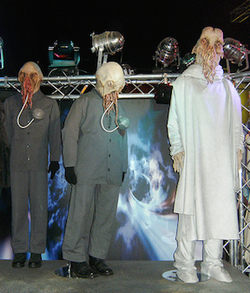Are you ready for the AIME?
 The Annual Interplanetary Mathematics Examination (AIME) is written by a committee of five Martians, five Venusians, and five Earthlings. At meetings, committee members sit at a round table with chairs numbered from 1 to 15 in clockwise order. Committee rules state that a Martian must occupy chair 1 and an Earthling must occupy chair 15, Furthermore, no Earthling can sit immediately to the left of a Martian, no Martian can sit immediately to the left of a Venusian, and no Venusian can sit immediately to the left of an Earthling. The number of possible seating arrangements for the committee is
. Find N.
The Annual Interplanetary Mathematics Examination (AIME) is written by a committee of five Martians, five Venusians, and five Earthlings. At meetings, committee members sit at a round table with chairs numbered from 1 to 15 in clockwise order. Committee rules state that a Martian must occupy chair 1 and an Earthling must occupy chair 15, Furthermore, no Earthling can sit immediately to the left of a Martian, no Martian can sit immediately to the left of a Venusian, and no Venusian can sit immediately to the left of an Earthling. The number of possible seating arrangements for the committee is
. Find N.
Image credit: Flickr Shining.darkness
The answer is 346.
This section requires Javascript.
You are seeing this because something didn't load right. We suggest you, (a) try
refreshing the page, (b) enabling javascript if it is disabled on your browser and,
finally, (c)
loading the
non-javascript version of this page
. We're sorry about the hassle.
since the 5 members of each plant committee are distinct we get that the number of arrangement of sittings is in the form N*(5!)^3 because for each M,V,E sequence we have 5! arrangements within the Ms, Vs, and Es. which results in a number above
Since after each planet, only members of another planet can follow, we simply count the lengths of the blocks adding up to ten. These blocks must be of the form MVE with a certain number of M's,V's,and E's,we consider a few different cases:
1 . One block of five people- There is only one way to arrange this so 1 3 = 1 .
2 . Five blocks of one person - There is also only one way to arrange this so we get 1 3 = 1 .
3 . Two blocks - There are two cases: 4+1 and 3+2. Each of these can be arranged two ways so we get ( 2 + 2 ) 3 = 6 4 .
4 . Three blocks - There are also two cases: 3+1+1 and 2+2+1.Each of these can be arranged three ways giving us ( 3 + 3 ) 3 = 2 1 6 .
5 . Four blocks - There is only one case: 2 + 1 + 1 + 1 . This can be arranged four ways giving us 4 3 = 6 4 .
Combining all these cases, we get 1 + 1 + 6 4 + 6 4 + 2 1 6 = 3 4 6
Not my own solution